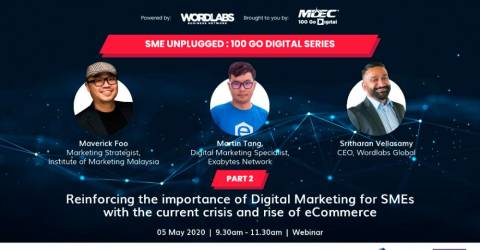
KUALA LUMPUR: At one point online marketing was just a new and different way to market. It opened up a new form of media on which to peddle goods and services. But within just the past few years, the importance of digital marketing has become something else.
Now it has become an integral part of what a business is to its customers. With the ongoing Movement Control Order still in effect, the call for businesses to jump onto the digital advertising platform has never been so imperative, said Sritharan Vellasamy, CEO of Wordlabs Business Network (WBN) during a public virtual event held on May 5.
The second instalment of the “SME Unplugged: 100 Digital Go Series” webinar series was held by WBN and Malaysia Digital Economy Corporation (MDEC) to help small and medium businesses understand the nuances of vital marketing component. Entitled, “Reinforcing the importance of Digital Marketing for SMEs with the current crisis and rise of eCommerce”, the webinar was divided into three sessions – a presentation delivered by a digital market specialist, a panel discussion with various industry leaders and a clinic on SEO guidelines, respectively.
“The base motivation today is that whenever we need to search for something, we go to Google. As such, you need to have a clear strategic goal for what you want to achieve online in your business. Digital marketing is the best cost-effective and accessible tool in the history of marketing. Even smaller companies can take on bigger companies with a smaller budget with strategic digital marketing,” Sritharan said during his opening remarks.
Speaker Maverick Foo shared his thoughts on how he envisions a post-coronavirus marketing landscape. Maverick is a marketing strategist with the Institute of Marketing Malaysia with 17 years of experience to his name. In his talk, “Future of Marketing: Debunking the Myth”, he shared some helpful tips on “how to get to the greener side of digital marketing”. He said that it is vital that SMEs get in on the game without delay, as customers are already one to two steps ahead of businesses.
To successfully attract a target audience, businesses need to prioritise their focus. He advised that while technology, creativity and strategy are all obvious factors to a successful campaign, psychology is key.
He went on to explain that businesses also needed to understand and adapt to take advantage of the current pandemic-influenced market trends. Terming it as “Bridging the Gap”, Maverick explained that traditional marketing tactics are now outdated with most retail transactions having moved online due to quarantine restrictions. Businesses need to not only have an online presence but be able to offer virtual experiences now that physical experiences are currently unavailable, e.g. selling art supplies and then providing virtual art lessons.
Similar sentiments were expressed during the panel discussion entitled, “Digital Marketing Strategies for an SME in a Post-Covid World”. The line-up for this week’s panel featured Girish Ramachandran, Executive Director of 27Advisory; Vittorio Furlan, Head of Business Insights for Ada Asia; and Eugene Lee Kun Keat, the Regional Marketing Director (Asia) for McDonald’s. The session was moderated by Bobby Varanasi, CEO of Matryzel.
Varanasi kicked off the session by asking the panellists why SMEs ought to pursue and invest in digital marketing, especially in the uncertainty of our present economic state. According to Ramachandran, digital marketing is essential for SMEs to acclimatize and to survive the recession.
“Malaysians have not been very aware of digital marketing. Now is the perfect time for SMEs to go into this. How many of the 1.4 million job losses will get re-hired? SMEs need to re-think and re-build their businesses based on the new marketing trends.”
On the same note, Eugene said businesses need to prepare for the “new normal” as it is unlikely that there will be a full return to traditional marketing methods.
“Because of the MCO, we’re seeing a 40% lift in digital consumption. This trend will be sustained into the future, into the new normal. Businesses must be prepared to shift funding and budgets to focus more on digital marketing.”
Furlan added that consumers still want to have the experience and SMEs need to work quickly to deliver the experience to customers in a different manner.
“Digitalisation and marketing is one aspect, businesses might also need to shift the way they do business. The businesses that live longer are the ones that understand their customers better and are able to capture information about their customers. This information will then help them to create the experience the customer wants.”
Offering insights on keeping one’s branding up to date with the trends, Eugene gave the following example: “Customers are now more used to brands being more human during this time. People want to hear about how the people behind the processes, the staff, are being kept safe. There’s been a shift in focus from the product in the brand to the people behind the brand.”
Ramachandran also cautioned businesses about establishing the right approach to attract and retain customers.
“Marketing is telling the right story. If you have a product that no one wants to buy, you need to rethink your existing product and business. We also have to be careful with direct marketing. People are not comfortable with that.”
